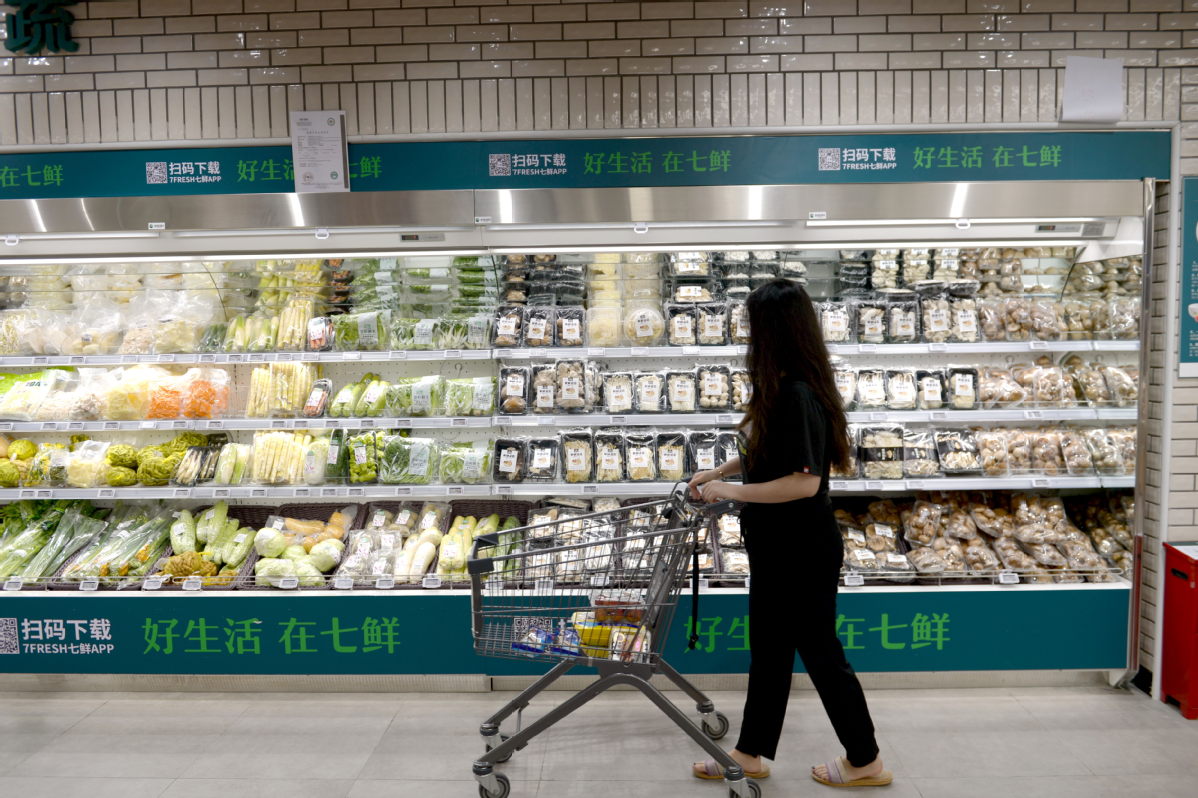Chinese digital economy gets big, 'fresh' boost


The size of the fresh food e-commerce market in China soared significantly from 90.3 billion yuan ($12.8 billion) in 2017 to 162 billion yuan in 2019, a recent report from market consultancy iiMedia Research said.
The report also forecast the total size of the domestic fresh food e-commerce market will reach 263.8 billion yuan this year, up almost 63 percent year-on-year, spurred by rising COVID-19-related demand.
Data from consultancy Analysys Qianfan showed that transactions on Miss Fresh, an e-commerce platform focusing on fresh food and other grocery products, surged by 350 percent year-on-year during the Spring Festival holiday. Home delivery orders on Wumart's Dmall digital platform rose by 95.3 percent on a yearly basis, with sales volume up by 225.7 percent year-on-year.
"In the past, some young users only bought fresh fruit at our platform. But now they are buying everything online, from meat, vegetables to rice, flour, cooking oil and other items," said Wang Jun, partner and CFO of Miss Fresh.
Wang said COVID-19 has accelerated the penetration rate of e-commerce grocery, lifted the per-customer transactions as well as attracted new groups of consumers, such as elderly people, who used to buy daily necessities at offline supermarkets.
During the epidemic, the company has taken urgent measures to increase the supply of fresh vegetables from its bases in the Inner Mongolia autonomous region, Yunnan and Shandong provinces, with the daily supply volume rising from 500 tons to 2,000 tons.
Front-end warehouses, which are located close to shoppers' communities and neighborhoods, are vital in determining competitiveness of online fresh food platforms. With its 1,500 front-end warehouses in 16 cities across the nation, Miss Fresh is capable of delivering its orders in half-hour flat.
Xu Zheng, founder and CEO of Miss Fresh, said the online fresh products market will witness rapid growth in the next five years. The company will accelerate its efforts to expand offerings and strengthen the supply chain construction, he said.
After new clusters of COVID-19 infection cases were reported in Beijing in mid-June, Miss Fresh has increased its supply of fruit, vegetables, meat and eggs by four to five times, ensuring almost all of these products came directly from producers and factories.
According to a report by market research company Euromonitor, the COVID-19 outbreak has given a big boost to the fresh food e-commerce sector.
The report said fresh food is a category with steady demand and a high consumption frequency. The segment is expected to witness accelerated online sales growth in 2020. Online sales of fresh food accounted for 6.3 percent of retail value in 2019, and this share is expected to increase in 2020, due to the quarantine policies and people's reluctance to go to crowded areas such as supermarkets or hypermarkets.
In addition, online catering platform Ele.me has cooperated with about 60,000 fresh food stores and supermarkets in 38 major cities across the nation, such as Beijing, Shanghai, Hangzhou and Wuhan to offer contactless delivery services, with the products ranging from vegetables, fruit, meat, poultry to seafood.
It has also increased the supply of high-quality fresh food coming directly from producers. Data from Ele.me showed the orders of fresh vegetables rose by nine times during the Spring Festival holiday in Beijing, compared with the same period last year.
Raymond Wang, partner at global consultancy Roland Berger, said: "The outbreak has further proved the importance of the internet and digital economy. For example, the e-commerce and online-to-offline, or O2O, business model has met people's daily requirements, while the traditional retail industry has taken a big hit."
He said that in the medium-and long-term, the outbreak would enhance social efficiency and result in a higher access rate for the burgeoning digital economy. "This is also a big opportunity for China's technology and business model innovation, the foundations of the digital economy."



































